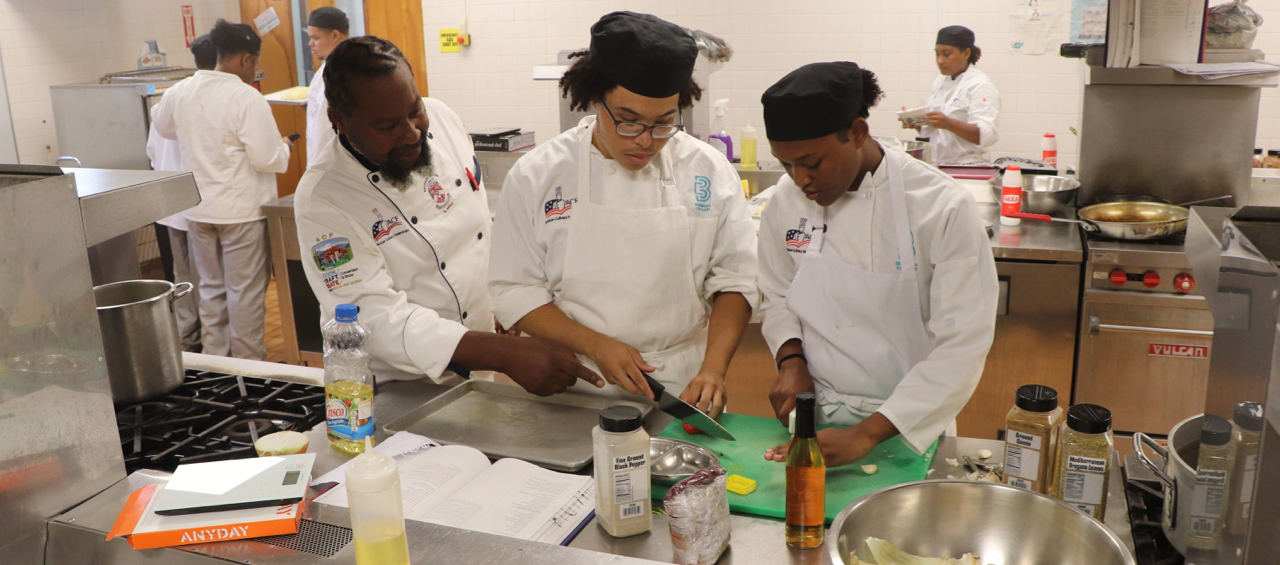Diploma in Plumbing Technology
Diploma in Plumbing Technology
The course requires that persons be working in the field continuously for a minimum of ten (10) years or possess an associates or higher degree. Graduates will be eligible to receive an industry-recognised certificate in Plumbing from the National Centre for Construction Education and Research (NCCER), meet the Bermuda National Training Board standard and receive a Bermuda College Diploma in Plumbing Technology. Students will be eligible to sit the City and Guilds Scheme 6129 examination.
Pre-requisite: NCCER Core (8CR)
Print
Programme Details
CURRICULUM TOTAL CREDITS: 35
Year 1
First semester - 8 credits
PLM 1101 Introduction to the Plumbing Profession, Safety & Tools 4
PLM 1102 Plastic Pipe, Copper, Cast Iron, Steel Piping and Fittings 2
PLM 1103 Fixtures and Faucets, Drains, Waste & Vent Systems, 2
Water Distribution Systems
Second semester - 10 credits
PLM 1104 Commercial Drawings, Hangers and Supports, Installing
DWV piping 4
PLM 1105 Types of Valves, Installing Water Supply Piping, Installing
Fixtures & Faucets 3
PLM 1106 Installing Water Heaters, Servicing Fixtures, Valves and Faucets 3
Year 2
First semester - 9 credits
PLM 2107 Sizing Water Supply Piping, Potable Water Treatment 3
PLM 2108 Backflow Preventers, Types of Venting, Sizing DWV Systems 4
PLM 2109 Sewage Pumps, Compressed Air 2
Second semester - 8 credits
PLM 2110 Business Principles for Plumbing, Water Pressure Systems 3
PLM 2111 Codes, Private Water Supply Well systems 3
PLM 2112 Swimming Pools and Hot Tubs, Plumbing for Mobile Homes 2
NCCER Core Courses
Basic Safety NCC 1101 1 SP/SM
Complies with OSHA-10 training requirements. Explains the safety obligations of workers, supervisors, and managers to ensure a safe workplace. Discusses the causes and results of accidents and the impact of accident costs. Reviews the role of company policies and OSHA regulations. Introduces common job-site hazards and identifies proper protections. Defines safe work procedures, proper use of personal protective equipment, and working with hazardous chemicals. Identifies other potential construction hazards, including hazardous material exposures, welding and cutting hazards, and confined spaces.
Mathematics NCC 1102 1 SP/SM
Reviews basic mathematical functions such as adding, subtracting, dividing, and multiplying whole numbers, fractions and decimals, and explains their applications to the construction trades. Explains how to use and read various length measurement tools, including standard and metric rulers and tape measures, and the architect’s and engineer’s scales. Explains decimal-fraction conversions and the metric system, using practical examples. Also reviews basic geometry as applied to common shapes and forms.
Hand Tools NCC 1103 1 SP/SM
Introduces trainees to hand tools that are widely used in the construction industry, such as hammers, saws, levels, pullers, and clamps. Explains the specific applications of each tool and shows how to use them properly. Also discusses important safety and maintenance issues related to hand tools.
Power Tools NCC 1104 1 SP/SM
Provides detail descriptions of commonly used power tools, such as drills, saws, grinders, and sanders. Reviews applications, proper use, safety, and maintenance. Many illustrations show power tools used in on-the-job settings.
Introduction to Construction Drawings NCC 1105 1 SP/SM
Familiarises trainees with basic terms for construction drawings, components, and symbols. Explains the different types of drawings (civil, architectural, structural, mechanical, plumbing/piping, electrical, and fire protection) and instructs trainees on how to interpret and use drawing dimensions. Four oversized drawings are included.
Basic Communication Skills NCC 1107 1 SP/SM
Provides trainees with techniques for communicating effectively with co-workers and supervisors. Includes practical examples that emphasise the importance of verbal and written information and instructions on the job. Also discusses effective telephone and e-mail communication skills.
Employability Skills NCC 1108 1 SP/SM
Identifies the roles of individuals and companies in the construction industry. Introduces trainees to critical thinking and problem solving skills and computer systems and their industry applications. Also reviews effective relationship skills, effective self-presentation and key workplace issues such as sexual harassment, stress and substance abuse.
Introduction to Materials Handling NCC 1109 1 SP/SM
Recognises hazards associated with materials handling and explains proper materials handling techniques and procedures. Also introduces materials handling equipment and identifies appropriate equipment for common job-site tasks.
Credit Course Descriptions
Diploma in Wood Technology
Diploma in Wood Technology
This programme has been designed to meet both the needs of the local carpentry industry and the requirements for the National Training Board and the National Centre for Construction Education and Research (NCCER).
This course requires that individuals have 10 years or more experience in the trade or possess an associate’s degree or higher. Students in the programme can expect to experience practical assignments, lectures and field trips to local building sites and industries. The self directed activities and supervised assistance will enable students to progress successfully through this programme.
Pre-requisite: NCCER Core (8CR)
Print
Programme Details
CURRICULUM TOTAL CREDITS: 38
Year 1
First semester - 9 credits
WTC 1101 Orientation, Materials, Fasteners, Hand and Power Tools 1
WTC 1102 Floor, Wall, Ceiling and Roof Framing 4
WTC 1103 Windows and Exterior Doors 4
Second semester - 12 credits
WTC 1104 Drawings; Cold Steel Framing; Exterior Framing and Roof Applications 4
WTC 1105 Drywall Installation; Drywall finishing; Suspended Ceilings 4
WTC 1106 Doors & Hardware; windows, Door-ceiling Trims; Cabinets 4
Year 2
First semester - 9 credits
WTC 2107 Properties of Concrete, Reinforcing, Handling and Placing Concrete 3
WTC 2108 Rigging Equipment, Rigging Practices; Trenching and Excavating 3
WTC 2109 Foundations and On Grade Slabs, Vertical and Horizontal Formwork; Tilt-up Panels 3
Second semester - 8 credits
WTC 2110 Advanced Roof, Floor and Wall Systems 4
WTC 2111 Introduction to Light Equipment, Welding and Metal Buildings 1
WTC 2112 Site Layout II – Angular Measurement, Advanced Stair Systems and Fundamentals of Crew Leadership 3
NCCER Core Courses
Basic Safety NCC 1101 1 SP/SM
Complies with OSHA-10 training requirements. Explains the safety obligations of workers, supervisors, and managers to ensure a safe workplace. Discusses the causes and results of accidents and the impact of accident costs. Reviews the role of company policies and OSHA regulations. Introduces common job-site hazards and identifies proper protections. Defines safe work procedures, proper use of personal protective equipment, and working with hazardous chemicals. Identifies other potential construction hazards, including hazardous material exposures, welding and cutting hazards, and confined spaces.
Mathematics NCC 1102 1 SP/SM
Reviews basic mathematical functions such as adding, subtracting, dividing, and multiplying whole numbers, fractions and decimals, and explains their applications to the construction trades. Explains how to use and read various length measurement tools, including standard and metric rulers and tape measures, and the architect’s and engineer’s scales. Explains decimal-fraction conversions and the metric system, using practical examples. Also reviews basic geometry as applied to common shapes and forms.
Hand Tools NCC 1103 1 SP/SM
Introduces trainees to hand tools that are widely used in the construction industry, such as hammers, saws, levels, pullers, and clamps. Explains the specific applications of each tool and shows how to use them properly. Also discusses important safety and maintenance issues related to hand tools.
Power Tools NCC 1104 1 SP/SM
Provides detail descriptions of commonly used power tools, such as drills, saws, grinders, and sanders. Reviews applications, proper use, safety, and maintenance. Many illustrations show power tools used in on-the-job settings.
Introduction to Construction Drawings NCC 1105 1 SP/SM
Familiarises trainees with basic terms for construction drawings, components, and symbols. Explains the different types of drawings (civil, architectural, structural, mechanical, plumbing/piping, electrical, and fire protection) and instructs trainees on how to interpret and use drawing dimensions. Four oversized drawings are included.
Basic Communication Skills NCC 1107 1 SP/SM
Provides trainees with techniques for communicating effectively with co-workers and supervisors. Includes practical examples that emphasise the importance of verbal and written information and instructions on the job. Also discusses effective telephone and e-mail communication skills.
Employability Skills NCC 1108 1 SP/SM
Identifies the roles of individuals and companies in the construction industry. Introduces trainees to critical thinking and problem solving skills and computer systems and their industry applications. Also reviews effective relationship skills, effective self-presentation and key workplace issues such as sexual harassment, stress and substance abuse.
Introduction to Materials Handling NCC 1109 1 SP/SM
Recognises hazards associated with materials handling and explains proper materials handling techniques and procedures. Also introduces materials handling equipment and identifies appropriate equipment for common job-site tasks.
Credit Course Descriptions
Diploma in Heating, Ventilation & Air Conditioning Technology
Diploma in Heating, Ventilation & Air Conditioning Technology
The course requires that persons be working in the field continuously for a minimum of ten (10) years or possess an associates or higher degree. Graduates will be eligible to receive an industry-recognised certificate in Heating, Ventilation & Air Conditioning (HVAC) from the National Centre for Construction Education and Research (NCCER) and also meet the Bermuda National Training Board standard and receive a Bermuda College Diploma in Heating,Ventilation & Air Conditioning (HVAC) Technology.
Pre-requisite: NCCER Core (8CR)
Print
Programme Details
CURRICULUM TOTAL CREDITS: 36
Year 1
First semester - 5 credits
HVA 1101 Fundamentals of Heating and Cooling 5
Second semester - 10 credits
HVA 1102 Mechanical Maintenance 3
HVA 1103 HVAC Controls 3
HVA 1104 Refrigeration System Service 4
Year 2
First semester - 10 credits
HVA 1105 Senior Student Project I 2
HVA 1106 Troubleshooting Heating 3
HVA 2107 Troubleshooting Cooling 3
HVA 2108 Hydronics 2
Second semester - 11 credits
HVA 2109 Senior Student Project II 2
HVA 2110 System Performance 3
HVA 2111 Energy Management 3
HVA 2112 System Design 3
NCCER Core Courses
Basic Safety NCC 1101 1 SP/SM
Complies with OSHA-10 training requirements. Explains the safety obligations of workers, supervisors, and managers to ensure a safe workplace. Discusses the causes and results of accidents and the impact of accident costs. Reviews the role of company policies and OSHA regulations. Introduces common job-site hazards and identifies proper protections. Defines safe work procedures, proper use of personal protective equipment, and working with hazardous chemicals. Identifies other potential construction hazards, including hazardous material exposures, welding and cutting hazards, and confined spaces.
Mathematics NCC 1102 1 SP/SM
Reviews basic mathematical functions such as adding, subtracting, dividing, and multiplying whole numbers, fractions and decimals, and explains their applications to the construction trades. Explains how to use and read various length measurement tools, including standard and metric rulers and tape measures, and the architect’s and engineer’s scales. Explains decimal-fraction conversions and the metric system, using practical examples. Also reviews basic geometry as applied to common shapes and forms.
Hand Tools NCC 1103 1 SP/SM
Introduces trainees to hand tools that are widely used in the construction industry, such as hammers, saws, levels, pullers, and clamps. Explains the specific applications of each tool and shows how to use them properly. Also discusses important safety and maintenance issues related to hand tools.
Power Tools NCC 1104 1 SP/SM
Provides detail descriptions of commonly used power tools, such as drills, saws, grinders, and sanders. Reviews applications, proper use, safety, and maintenance. Many illustrations show power tools used in on-the-job settings.
Introduction to Construction Drawings NCC 1105 1 SP/SM
Familiarises trainees with basic terms for construction drawings, components, and symbols. Explains the different types of drawings (civil, architectural, structural, mechanical, plumbing/piping, electrical, and fire protection) and instructs trainees on how to interpret and use drawing dimensions. Four oversized drawings are included.
Basic Communication Skills NCC 1107 1 SP/SM
Provides trainees with techniques for communicating effectively with co-workers and supervisors. Includes practical examples that emphasise the importance of verbal and written information and instructions on the job. Also discusses effective telephone and e-mail communication skills.
Employability Skills NCC 1108 1 SP/SM
Identifies the roles of individuals and companies in the construction industry. Introduces trainees to critical thinking and problem solving skills and computer systems and their industry applications. Also reviews effective relationship skills, effective self-presentation and key workplace issues such as sexual harassment, stress and substance abuse.
Introduction to Materials Handling NCC 1109 1 SP/SM
Recognises hazards associated with materials handling and explains proper materials handling techniques and procedures. Also introduces materials handling equipment and identifies appropriate equipment for common job-site tasks.
Credit Course Descriptions
Diploma in Motor Vehicle Technology
Diploma in Motor Vehicle Technology
This programme has been developed by the Bermuda College to provide persons working in the automotive industry the opportunity to receive technical training. The course requires that persons be working in the field for a minimum of ten (10) years or possess an associates or higher degree. Persons will be required to attend classes according to the time table and return to work after classes are completed; the modules are scheduled in the Bermuda College catalogue.
The curriculum is designed to meet industry standards with the intent that students sit the City & Guilds international certification. This program is modularised and takes two years to complete. Students will experience lectures, practical assignment and self-directed activities as they progress through the modules, working with the lecturer and being evaluated on a skills basis. Upon completion of the course, students will receive a Bermuda College Diploma in Motor Vehicle Technology.
Pre-requisite: NCCER Core (8CR)
Print
Programme Details
CURRICULUM TOTAL CREDITS: 21
Year 1
First semester - 9 credits
MVT 1104 Electrical Systems 3
MVT 1105 Battery/Charging Systems 3
MVT 1106 Starting Systems 3
Second semester - 6 credits
MVT 1101 Ignition Systems 2
MVT 1102 Fuel/Exhaust Systems 2
MVT 1103 Exhaust Emissions Systems 2
Year 2
First semester - 3 credits
MVT 2107 Braking Systems 1
MVT 2108 Hydraulic Brake Systems 1
MVT 2109 Anti-Lock Brake Systems 1
Second semester - 3 credits
MVT 2110 Steering Systems 1
MVT 2111 Power Steering Systems 1
MVT 2112 Suspension Systems 1
NCCER Core Courses
Basic Safety NCC 1101 1 SP/SM
Complies with OSHA-10 training requirements. Explains the safety obligations of workers, supervisors, and managers to ensure a safe workplace. Discusses the causes and results of accidents and the impact of accident costs. Reviews the role of company policies and OSHA regulations. Introduces common job-site hazards and identifies proper protections. Defines safe work procedures, proper use of personal protective equipment, and working with hazardous chemicals. Identifies other potential construction hazards, including hazardous material exposures, welding and cutting hazards, and confined spaces.
Mathematics NCC 1102 1 SP/SM
Reviews basic mathematical functions such as adding, subtracting, dividing, and multiplying whole numbers, fractions and decimals, and explains their applications to the construction trades. Explains how to use and read various length measurement tools, including standard and metric rulers and tape measures, and the architect’s and engineer’s scales. Explains decimal-fraction conversions and the metric system, using practical examples. Also reviews basic geometry as applied to common shapes and forms.
Hand Tools NCC 1103 1 SP/SM
Introduces trainees to hand tools that are widely used in the construction industry, such as hammers, saws, levels, pullers, and clamps. Explains the specific applications of each tool and shows how to use them properly. Also discusses important safety and maintenance issues related to hand tools.
Power Tools NCC 1104 1 SP/SM
Provides detail descriptions of commonly used power tools, such as drills, saws, grinders, and sanders. Reviews applications, proper use, safety, and maintenance. Many illustrations show power tools used in on-the-job settings.
Introduction to Construction Drawings NCC 1105 1 SP/SM
Familiarises trainees with basic terms for construction drawings, components, and symbols. Explains the different types of drawings (civil, architectural, structural, mechanical, plumbing/piping, electrical, and fire protection) and instructs trainees on how to interpret and use drawing dimensions. Four oversized drawings are included.
Basic Communication Skills NCC 1107 1 SP/SM
Provides trainees with techniques for communicating effectively with co-workers and supervisors. Includes practical examples that emphasise the importance of verbal and written information and instructions on the job. Also discusses effective telephone and e-mail communication skills.
Employability Skills NCC 1108 1 SP/SM
Identifies the roles of individuals and companies in the construction industry. Introduces trainees to critical thinking and problem solving skills and computer systems and their industry applications. Also reviews effective relationship skills, effective self-presentation and key workplace issues such as sexual harassment, stress and substance abuse.
Introduction to Materials Handling NCC 1109 1 SP/SM
Recognises hazards associated with materials handling and explains proper materials handling techniques and procedures. Also introduces materials handling equipment and identifies appropriate equipment for common job-site tasks.
Credit Course Descriptions
Diploma in Food & Beverage Management
Diploma in Food & Beverage Management
This diploma has been developed to provide persons working in the food and beverage industry the opportunity to receive academic qualifications. It is designed for persons who have joined the industry without any formal certification in the field and requires work experience in the field for a minimum of five (5) years, or approval from the Dean, or that the person possesses an associates degree or higher. This diploma will allow students to formalise their training and experience.
Print
Programme Details
CURRICULUM TOTAL CREDITS: 20
CUL 1104 Sanitation and Safety 2
CUL 1106 Purchasing and Product Identification 3
FAB 1100 Food Service 3
CUL 2118 Menu Planning or
HMT 1265 Hospitality Sales and Marketing 3
HMT 2255 Hospitality Supervisory Practices* 3
HMT 2260 Food & Beverage Management 3
*Before you can be enrolled in any course, you must satisfy the pre-requisites.













